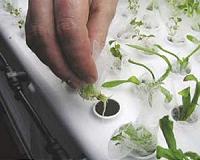 |
Sydney (AFP) April 7, 2011 The first space tourist flights may be several years away but a group of thirsty Australian scientists are at work on the critical question -- what makes a top zero-gravity beer? Researchers at the Queensland University of Technology have been working since November, testing various recipes in their microgravity "drop tower", which simulates space conditions, in search of the perfect brew. Flavour and fizz are key factors -- the tongue swells in space, affecting the tastebuds, while lower carbonation is needed. Lead researcher Martin Castillo, formerly an engineer with Japan's JAXA space agency, said the 21-metre (70-foot) anti-friction chute allowed beer droplets to achieve about two seconds of low gravity. "Australian students are quite keen to develop microgravity beer projects," Castillo joked. The team examined how fizzy each of the recipes were at high acceleration, and the ideal properties for keeping it cool, as well as the "drinkability factor" and ever-elusive perfect head of foam, he said. "All this bundled together -- the carbonation, the frothing on the top, the drinkability, the way the liquid cohesively agglomerates -- all of this is put into a final product for... going up into the (International) Space Station, low earth orbit satellites, things like that that humans can go onto," Castillo told AFP. Sydney brewer 4 Pines and Saber Astronautics Australia, a commercial space firm, are using the research to fine-tune their "Vostok" space beer range, which had its maiden voyage at Florida's Cape Canaveral in February. Named for Russia's first manned space mission, Vostok Space Stout was taste-tested at zero gravity by an "astronaut for hire" who gave it the thumbs-up after consuming almost a litre of the brew on a parabolic arc flight. Basic biometric data was recorded to track the impact on his body, as well as his rating of the beer compared with sea-level impressions. Castillo said his team was at the "very start of all of our preliminary research" and the brewers had more work to do on understanding the effects of microgravity on alcohol absorption. The Queensland tests were physio-chemical only -- "no taste-testing involved for us," he added.
Share This Article With Planet Earth
Related Links Space Tourism, Space Transport and Space Exploration News
 Can We Grow Crops On Other Planets
Can We Grow Crops On Other PlanetsMoffett Field CA (SPX) Nov 28, 2010 Science fiction lovers aren't the only ones captivated by the possibility of colonizing another planet. Scientists are engaging in numerous research projects that focus on determining how habitable other planets are for life. Mars, for example, is revealing more and more evidence that it probably once had liquid water on its surface, and could one day become a home away from home for humans. ... read more |
|
| The content herein, unless otherwise known to be public domain, are Copyright 1995-2010 - SpaceDaily. AFP and UPI Wire Stories are copyright Agence France-Presse and United Press International. ESA Portal Reports are copyright European Space Agency. All NASA sourced material is public domain. Additional copyrights may apply in whole or part to other bona fide parties. Advertising does not imply endorsement,agreement or approval of any opinions, statements or information provided by SpaceDaily on any Web page published or hosted by SpaceDaily. Privacy Statement |